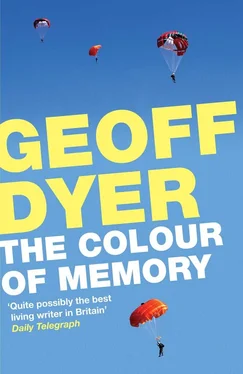The judge didn’t look at him sternly or savagely; he hardly looked at him at all. The whole thing was conducted like a bored ceremony that had considerable power but which no longer had any meaning. Clarifying points of legal procedure for the benefit of the jury, with a bored impatience he made no attempt to conceal, the judge made it plain that he had no interest in either the judicial or human aspects of the case — the only time he showed any alacrity was in arranging adjournments for lunch. The members of the jury were bored too; they wished they were involved in something more interesting like armed robbery or rape. There was nothing about the kid being tried to threaten the indifference or rouse the interest of anyone in the Court. The proceedings left him with only two options: insolence or submissiveness — and since there was nothing to be gained by either of these he looked bored. The nominal object of the court’s attention, he played a part in its proceedings only to the extent that someone getting stitched up by doctors participates in surgery.
If he got convicted, he told me during one of several adjournments, he’d probably end up back inside. He could handle that if he had to. Maybe he’d get off with a suspended sentence in which case he’d have the summer to look forward to.
The case dragged on. Each day I commuted down to Croydon in my suit. The longer the case went on the more money I earned (I’d already begun to think like a lawyer). Somehow the elaborate indifference of the court proceedings coloured — or rather, they did exactly the opposite, drained all colour from — my feelings for the boy. He became simply ‘the accused’, an abstraction, a legal term. Both his case and the circumstances in which he was being tried were dwarfed by the lofty ethics of justice in whose name they were being carried out. In the praxis of the Court all that remained of the ideal it embodied was the shabby paraphernalia of robes and wigs, the elaborate hierarchical etiquette with which only the officers of the court were familiar.
After a brief adjournment the jury proudly delivered their verdict of guilty. It was as if by announcing his guilt they had negatively affirmed their own freedom from civic wrongdoing, demonstrated to the Court their own harmlessness. The judge looked gravely over his glasses and handed out a suspended sentence, pointing out to this sad eighteen-year-old (the accused, the defendant, the client — or did he have some new title now that his guilt had been established and proved beyond reasonable doubt?) that the suspended prison term would be there, hanging over his head like the sword of Damocles. Unimpressed by the classical reference the defendant didn’t even blink. I walked with him back to the station. He borrowed a pound for the train fare to London and bought a pack of cigarettes. That was the last I saw of him. I called in at the solicitor’s office, claimed half a day more than I’d actually worked and multiplied my claim for travelling expenses by improbable complications of route. They didn’t seem bothered one way or the other.
Suddenly, like a submarine breaking the surface of the ocean after long months beneath the waves, it was summer. From open windows, radio chat tinkled to the street. Carlton and I walked round the market, ostensibly to buy vegetables but really just for the pleasure of seeing bare arms and legs, women in dresses, sunglasses, the sun on people’s faces. The market was clogged up with smiling people. Coins glinted in the sun as they were handed over. The stallholders had something to say to everybody. No one wanted potatoes or turnips. It was oranges that compelled attention, piled on top of each other, two halves cut open and glistening freshly at the bottom of each stack. Apples, lemons, grapefruits, tomatoes swelling redly in the heat. Next to the fruit-seller the man who ran the china stall pinned up a notice — ‘Please don’t stand in front of my stall. It’s not a waiting-room for the fruit-stall’ — and was happy to let the sun polish his wares. Winding through the noise was the sound of an ice-cream van; today was the first day of the year he was selling more ice-creams than hotdogs. I bought a can of coke that tasted like being hit in the teeth gradually. A group of young guys, heads almost shaved and wearing Raybans, trainers and black leather jackets moved fast through the crowd. Heavy women were clinging to their shopping and laughing with their friends. There was the smell of coconut oil in hair, glistening. Music from shop doorways mingled and remixed in the open air. Splotches of ice-cream on the pavement. A car went by, trailing a loud exhaust of hip-hop.
‘Greenpeace,’ said Luther shaking his coffee jar suggestively in front of an American tourist with a camera and wide-angle check trousers. A mad guy with locks and a walking-stick was shouting ‘let me out! let me out’ as if he was locked up inside himself. A tall rasta in a blue tracksuit strode past taking no notice of anything except where he was going. At the Recreation Centre a BBC news team were stopping representative-looking people and asking how Brixton had changed since the riots. Other representative-looking people shrugged through the heavy doors, struggling under a bulk of muscle which, until they got to the weights room, looked awkward and inessential as a diver’s tanks.
‘I’d give my right arm for biceps like that,’ I said to Carlton.
We made our way along the crowded pavement, the elderly moved cautiously along in jackets and ties, in cardigans and coats. I saw Freddie’s bike, locked up to a lamp-post by the tube station. A young punk with grey arms and eyes so pinned you wondered how any light got in asked Carlton for money.
‘I’m always giving you money, man.’
‘I’m always skint.’
Carlton handed him some coins. We crossed the High Street where the traffic was hardly moving. Bus drivers, shirt sleeves rolled up to their elbows, sat it out; conductors hung from the back platforms of their buses. From somewhere in the congealing traffic a police car wailed pointlessly.
We stopped off at the Trinity and sat outside, our beer warming quickly in the sun. It was like a little bit of Islington, estate agents said of this square, with its pub and restaurant. The small forecourt of the pub was packed with people who looked like they worked for the council, arguing departmental politics, getting a few down them and loosening their ties. I felt sleepy drunk after one pint but still only just resisted the temptation to have a couple more.
‘It’s riot weather this, perfect riot weather,’ said a shiny-faced white guy, holding his beer up to the sun as if reading the future in the dregs.
Slowly, dragging our bags of produce, we walked along the High Street past the smearily opaqued front of a large shop that was being refitted. This often happened: a shop selling mass-produced beds and furniture started up with an opening sale that lasted for a couple of months. Then there was a closing-down sale and as soon as that finished the windows were whited over and signs saying ‘New Shop Opening Soon’ appeared. Then a new shop — called Price Slasher, or Cost Buster — opened on the old premises, selling exactly the same thing.
‘That must be the worst shop in London,’ said Carlton. ‘The only decent thing you can buy in there is a black bin-liner.’
A few yards further on was the new, refurbished Woolworths where they used to stock nothing except security guards and empty shelves. We walked past the Ritzy and the library where round-the-year alcoholics stuck with the Tennants Extra that served as anti-freeze through the long months of winter. A few steps further on we passed a place called Brixton Fashion. For a long time no one knew what it was supposed to be: there was only this elaborate designer façade with nothing going on behind it. Then Freddie pointed out that our confusion was due to wondering what was happening behind the façade when what was going on here was, precisely, the façade. The whole thing existed solely in the realm of display. The front wasn’t the outward display of a concealed function: the façade was the function.
Читать дальше












